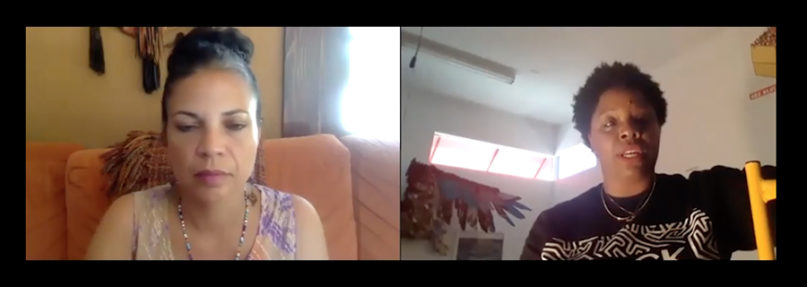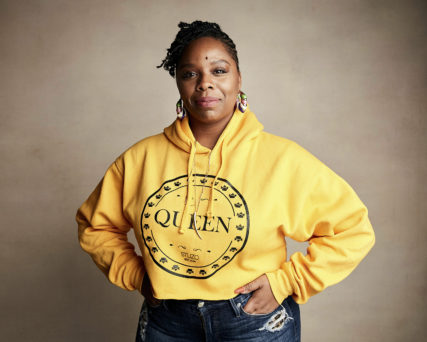
LOS ANGELES (RNS) — A recorded prayer for Ahmaud Arbery, Breonna Taylor and George Floyd played on repeat as Black Lives Matter co-founder Patrisse Cullors shredded sheets of paper with the words “police” and “white racism.”
In the background, a pair of wings hung against a wall as candles lit up the room. Cullors stood in the middle of the wings, shredding.
This was part of a live virtual performance, “A Prayer for the Runner,” that the Fowler Museum at UCLA hosted on Saturday (June 13).
The event was organized in May — before the police killings of Taylor and Floyd energized the nation and globe into protest — to, as curator Bianca Collins put it, “offer space for healing” after the unarmed Arbery was shot to death while out for a run in Georgia.
Now, the performance aimed to mourn the lives of the three victims and others, as well as “honor the power of an uprising” that has denounced police brutality and called on cities nationwide to defund their police departments.
After the performance, Melina Abdullah, co-founder of Black Lives Matter-Los Angeles, joined Cullors in a discussion that touched on the role that spirituality and prayer has played in the movement.
“Part of our calling as people who do this work for Black lives is to lift our people up, both in their living, but also in their death,” Cullors said. “The need to lift our folks up feels so incredibly spirit-driven for me.”

Melina Abdullah, left, and Patrisse Cullors discuss the role that spirituality and prayer has played in the Black Lives Matter movement, during a program by the Fowler Museum at UCLA. Video screengrab
Abdullah and Cullors touched on the practice of calling out the names of the victims that they advocate for in protests and demonstrations. It’s kind of a way to invoke their spirits, Abdullah said.
Uplifting the names of victims goes beyond creating hashtags, Cullors said.
“It is literally almost resurrecting a spirit so they can work through us to get the work that we need to get done,” she said.
By highlighting their names, Cullors said she feels “personally connected and responsible and accountable to them, both from a deeply political place but also from a deeply spiritual place.”
Cullors touched on West African traditions that center on remembering ancestors.
“I feel like part of the story in the building of BLM was about remembering — and remembering our people, not based off of a white supremacist memory, which would be about slandering them and putting their names in the newspaper and showing their mugshots,” she said. “But, instead remembering them from the place that their mothers and their fathers and their family would want us to remember them in.”
Cullors, who grew up Jehovah’s Witness, said she “was always someone who almost obsessed about our (Black) ancestors.”

Patrisse Cullors poses for a portrait during the Sundance Film Festival, Sunday, Jan. 27, 2019, in Park City, Utah. (Photo by Taylor Jewell/Invision/AP)
“I wasn’t raised with honoring ancestors. … As I got older and started to feel like I was missing something, ancestral worship became really important,” she said.
The women also touched on their tradition of praying and pouring libations during demonstrations.
In a June 9 article,”The Fight for Black Lives is a Spiritual Movement,” Hebah Farrag — assistant director of research at the USC Center for Religion and Civic Culture — examined how Abdullah led a group of demonstrators in a ritual at a recent protest outside of Los Angeles Mayor Eric Garcetti’s home.
As part of the ritual, people recited the names of “those taken by state violence before their time — ancestors now being called back to animate their own justice,” Farrag wrote.
After each name, Abdullah poured libations on the ground as the group in return chanted “Asé.” The Yoruba term is “often used by practitioners of Ifa, a faith and divination system that originated in West Africa,” Farrag wrote.
Abdullah on Saturday said it took her almost a year before she realized Black Lives Matter was much more than a racial and social justice movement.
“At its core, it’s a spiritual movement,” she said.
Cullors said it became clear to her they needed “spiritual protection” as Black Lives Matter was targeted by the right, by police and by neo-Nazis.
To Cullors, she wouldn’t be able to do this work without spiritual practice.
“It would be antithetical,” she said.
